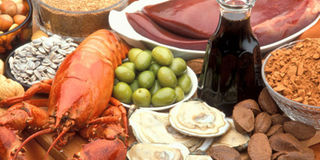How to manage food allergies

Since childhood, Rehema Nanyonga Mbabaali, a retired civil servant, has been allergic to ghee. “When I smell ghee, I immediately develop a skin rash. Sometimes it comes with nausea and vomiting. I also lose appetite for two to three days,” Nanyonga says. When the rash develops, Nanyonga says she gets medication but it does not work. She, therefore, resorts to taking pilton, which she says stops the rash faster.
Catherine Nanozi, a nutritionist at Cathy’s Wellness Centre at Nsambya Hospital, says sweet foods such as soda, sugar and honey, when taken in large amounts, increase your sensitivity and reaction to different foods. “If you are allergic to eating meat, it is advisable to reduce the amount of sugar you consume. This will reduce your sensitivity to the foods you are allergic to,” Nanozi explains.
Reaction
Dr Umarashid Guloba of Makerere University Business School, says a food allergy is the body’s reaction to a substance that the immune system perceives to be harmful to the body.When your body’s immunity fails to fight off a foreign food or substance to keep you healthy and eliminate the infection, it leads to the occurrence of a food allergy.
“The degree of reaction depends on the substance’s strength. The stronger the food substance, the higher the reaction and vice versa,” Dr Guloba says.
Allergy symptoms
In common scenarios, Dr Guloba says common symptoms of food allergies include vomiting, nausea, stomach upset, skin or body rash, body swellings, and difficulty in breathing. He adds that in extreme cases, food allergies lead to a condition called anaphylaxis, where the airways block, resulting in death.
How to manage allergies
Dr Guloba gives the following tips.
Read food lables. Today, food labels include important allergy information such as whether any additives contain milk protein or byproducts of wheat, or whether a food was produced in a facility that processes nuts. Still, you need to read every label, every time, even if you have purchased the item hundreds of times before.
Dine out defensively. It is wise to let the manager or chef know about your food allergy before you order. People with food allergies often carry a chef card — a printed note specifying all the ingredients you are allergic to as well as a request that all dishes, utensils, and preparation surfaces be free from traces of that food.
Formulate an action plan. Make a list of steps to take should you accidentally eat the food you are allergic to, and carry a printed copy of the plan with you.
Always carry your medication. If your doctor has prescribed emergency medication, always take it with you and always carry two dozes to be sure you are prepared in case you get into trouble. Some people with food allergies also carry antihistamines (drugs used to treat allergies). Do not leave home without your medications.




